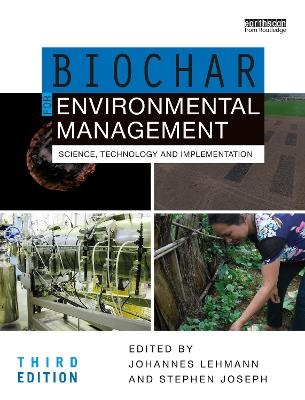
Biochar for Environmental Management
Routledge (Verlag)
978-1-032-28615-0 (ISBN)
Research on biochar continues to accelerate as its importance for soil health, climate change mitigation and adoption, and the circular economy becomes more widely acknowledged. This book not only reviews recent advances made in our understanding of biochar properties, behavior, and effects in agriculture, environmental management, and material production, but specifically develops fundamental principles and frameworks of biochar science and application. This third edition has been fully revised and updated to reflect recent developments and growing trends, with important coverage of the application of biochar outside of its traditional soil-based uses, the commercialization of biochar, and its incorporation into policy. This includes brand new chapters on the role of biochar-based materials for environmental remediation, building construction, and animal feed, and a greater discussion of biochar's role in the circular economy, climate change mitigation, and sustainable development. Overall, this book provides a systematic, comprehensive, and global examination of biochar. Written by an international team of academics and professionals, it addresses its uses, production, and management and its broader potential for mitigating climate change and driving forward sustainable development.
Edited by two leading figures in the field, Biochar for Environmental Management is essential reading for students, scholars, practitioners, and policymakers interested in biochar and the role it can play in environmental sustainability and global sustainable development.
Johannes Lehmann is Liberty Hyde Bailey Professor of soil biogeochemistry and soil fertility management at Cornell University, USA, Co-founder of the International Biochar Initiative, and member of the U.S. National Academy of Sciences and the German National Academy of Sciences (Leopoldina). Stephen Joseph is a visiting Professor in the School of Materials Science and Engineering at the University of New South Wales, Australia, and Co-founder of the International Biochar Initiative.
Chapter 1: Biochar for environmental management – an introduction
Johannes Lehmann, Stephen Joseph
Chapter 2: Historical accumulation of Biochar as soil amendment
Bruno Glaser, Doyle McKey, Luise Giani, Wenceslau Teixeira, Giuseppe di Rauso Simeone, Jens Schneeweiß, Nguyen Hien, Jeffrey Homburg
Chapter 3: Fundamentals of biochar production
Robert C. Brown, Santanu Bakshi, Ondřej Mašek
Chapter 4: Biochar production technology
Ondřej Mašek, Robert C. Brown, Santanu Bakshi
Chapter 5: Characteristics of biochar – physical and structural properties
Catherine E. Brewer
Chapter 6: Characteristics of biochar – micro- and nano-chemical properties and interactions
Sohrab Haghighi Mood, Kalidas Mainalis, Manuel Raul Pelaez-Samaniego, Manuel Garcia-Perez
Chapter 7: Characteristics of biochar – macro-molecular properties
William C. Hockaday, Markus Kleber, Peter S. Nico
Chapter 8: Characteristics of biochar – nutrient properties
Joann K. Whalen, Leanne Ejack, Shamim Gul, Leonardo León Castro
Chapter 9: A biochar classification system and associated test methods
Balwant Singh, James E. Amonette, Marta Camps-Arbestain, Rai S. Kookana
Chapter 10: Aging of biochar in soils and its implications
Joseph J. Pignatello, Minori Uchimiya, Samuel Abiven
Chapter 11: Persistence of biochar: mechanisms, measurements, predictions
Johannes Lehmann, Samuel Abiven, Elias Azzi, Yunying Fang, Bhupinderpal Singh, Saran Sohi, Cecilia Sundberg, Dominic Woolf, Andrew R. Zimmerman
Chapter 12: Biochar transport in terrestrial ecosystems: fate and impact
Cornelia Rumpel
Chapter 13: Plant productivity with biochar applications to soils
Simon Jeffery, Frank Verheijen, Diego Abalos, Ana Bastos
Chapter 14: Biochar Effects on Soil Biota
Janice E. Thies, Xavier Domene, Stephen Joseph, Xaiofan Rong, Johannes Lehmann
Chapter 15: Biochar effects on plant ecophysiology
Claudia Kammann, Ellen Graber
Chapter 16: Biochar effects on soil nutrient transformation
Thomas H. DeLuca, Michael J.Gundale, M. Derek MacKenzie, Si Gao, Davey L. Jones
Chapter 17: Biochar effects on soil carbon turnover
Thea Whitman, Yunying Fang, Yu Luo
Chapter 18: Biochar influences methane and nitrous oxide emissions from soil
Lukas Van Zwieten, Maria Luz Cayuela, Claudia Kammann, Stephen Joseph, Nicole Wrage-Mönnig, Annette Cowie, Niloofar Karimian, Ehsan Tavakkoli
Chapter 19: Biochar effects on nutrient leaching
Shahla Hosseini Bai, Michael B. Farrar, Marta Gallart, Frédérique Reverchon, Sara Tahery, Negar Omidvar, Edith Kichamu-Wachira, Stephen Joseph
Chapter 20: Biochar effects on water availability
Xiaodong Gao, Caroline A. Masiello
Chapter 21: Biochar and heavy metals
Luke Beesley, Beatriz Cerqueira Cancelo, Michael Hardman, Manhattan Lebrun, Kerry Mitchell, Lukas Trakal
Chapter 22: Organic contaminants in biochar
Wolfram Buss, Christian Wurzer, Jessica G. Shepherd, Thomas D. Bucheli
Chapter 23: How does biochar influence plant biotic stress?
Amit K. Jaiswal, Omer Frenkel, Jane Debode, Ellen R. Graber
Chapter 24: Test procedures for biochar analysis in soils
Michael Bird
Chapter 25: Biochar handling, storage, and transportation
Tom Miles
Chapter 26: Biochar-based fertilizers, co-composting, and growth media
Leônidas Carrijo Azevedo Melo, Carlos Alberto Silva, Miguel Sánchez-Monedero, Keiji Jindo, Sarasadat Taherymoosavi, Stephen Joseph
Chapter 27: Biochar-based materials for environmental remediation
Hailong Wang, Hanbo Chen, Nanthi Bolan, Shengsen Wang
Chapter 28: Biochar as building and road material
Harn Wei
Chapter 29: Biochar as an animal feed ingredient
Roger Hagerty, Stephen Joseph, Melissa Rebbeck, Sarah Meale, Nicholas Paul
Chapter 30: Biochar, greenhouse gas accounting and climate change mitigation
Annette Cowie, Elias Azzi, Zhe H. Weng, Dominic Woolf
Chapter 31: Biochar sustainability
Cecilia Sundberg, Elias Azzi
Chapter 32: Markets for biochar products and services
Josef Maroušek, Anna Maroušková, Otakar Strunecký, Babak Minofar
Chapter 33: Economics of biochar production and use
Stephen Joseph, Simon Shackley, Ruy Anaya de la Rosa, Gerard Cornelissen, Adam O’Toole, Einar Stuve
Chapter 34: Policy and biochar
Tristan Brown, Jenny R. Frank
Chapter 35: Biochar in environmental management: outlook and conclusion
Yong Sik Ok, Piumi Amasha Withana, Stephen Joseph, Johannes Lehmann
| Erscheinungsdatum | 03.05.2024 |
|---|---|
| Zusatzinfo | 62 Tables, color; 96 Line drawings, color; 93 Halftones, color; 189 Illustrations, color |
| Verlagsort | London |
| Sprache | englisch |
| Maße | 189 x 246 mm |
| Gewicht | 1830 g |
| Themenwelt | Naturwissenschaften ► Biologie ► Botanik |
| Weitere Fachgebiete ► Land- / Forstwirtschaft / Fischerei | |
| ISBN-10 | 1-032-28615-6 / 1032286156 |
| ISBN-13 | 978-1-032-28615-0 / 9781032286150 |
| Zustand | Neuware |
| Informationen gemäß Produktsicherheitsverordnung (GPSR) | |
| Haben Sie eine Frage zum Produkt? |
aus dem Bereich


